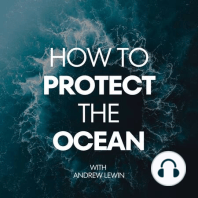18 min listen

Ocean Acidification: Exploring the "Silent" Impact of Climate Change
Ocean Acidification: Exploring the "Silent" Impact of Climate Change
ratings:
Length:
27 minutes
Released:
Nov 20, 2023
Format:
Podcast episode
Description
In this episode of the How to Protect the Ocean podcast, host Andrew Lewin discusses the often overlooked consequence of climate change: ocean acidification. He explains what ocean acidification is, its impact on the oceans, and explores potential solutions. This important issue is rarely discussed in the media, making it crucial for listeners to be informed and take action. Link to article: https://greencoast.org/ocean-acidification-solutions/ Share your conservation journey on the podcast by booking here: https://calendly.com/sufb/sufb-interview Fill out our listener survey: https://www.speakupforblue.com/survey Join the audio program - Build Your Marine Science and Conservation Career: https://www.speakupforblue.com/career Facebook Group: https://bit.ly/3NmYvsI Connect with Speak Up For Blue: Website: https://bit.ly/3fOF3Wf Instagram: https://bit.ly/3rIaJSG Twitter: https://bit.ly/3rHZxpc In this episode, the host discusses the significance of utilizing alternative modes of transportation, such as walking, cycling, or public transport, to decrease carbon emissions from cars. The host emphasizes that these alternative transportation methods not only benefit the environment but also promote personal health. While the host acknowledges that electric vehicles (EVs) are a viable option for transportation since they don't consume fossil fuels and therefore don't contribute to carbon emissions, they also encourage the use of walking, cycling, or public transport. These options are not only environmentally friendly but also promote physical activity and overall well-being. Furthermore, the host highlights the concept of reducing food miles as a means to minimize transportation-related carbon emissions. They suggest consuming locally grown foods and eating locally, as most meals in the US travel over 1,500 miles to reach consumers. By purchasing and consuming local and seasonal food, individuals can reduce the energy and CO2 emissions associated with food transportation. Overall, the episode emphasizes the importance of utilizing alternative modes of transportation, such as walking, cycling, or public transport, to reduce carbon emissions from cars. It also promotes the idea of eating locally and consuming locally grown foods to minimize transportation-related carbon emissions. In this episode, the host emphasizes the significance of eating locally grown foods as a way to reduce the transportation of food and the associated carbon emissions. The host explains that most meals in the US travel over 1,500 miles to reach our plates, and this transportation by road, rail, or air consumes energy and releases CO2, with air freight being the most polluting. By choosing to eat locally, such as shopping at farmer's markets or local groceries, individuals can significantly reduce the distance that food needs to travel. The host emphasizes the benefits of consuming seasonal food that is available in and around our area. By doing so, we can switch to foods that are readily available and do not require long-distance transportation. This not only reduces carbon emissions but also allows individuals to connect with the food in their local communities. Additionally, the host mentions the concept of "food miles," which refers to the distance that food travels from the farm to the consumer. By reducing food miles through the consumption of locally grown foods, individuals can contribute to reducing the carbon footprint associated with food transportation. Overall, the episode emphasizes the importance of eating locally grown foods as a way to reduce the transportation of food and the associated carbon emissions. By making conscious choices and opting for seasonal and locally sourced food, individuals can play a significant role in mitigating the environmental impact of the food industry. In this episode, the host discusses the importance of repair, reuse, and recycling to decrease carbon emissions from manufacturing new product
Released:
Nov 20, 2023
Format:
Podcast episode
Titles in the series (100)
SUFB 067: Climate Change Needs to be Halted for Coral Reef Survival: COP 21 is in full effect and the talks are happening. Canada jut committed to 1.5 C below Pre-industrial levels. However, action will be the key to real change and it is needed to make sure coral reefs survive and, in turn, the many people who depend... by How To Protect The Ocean